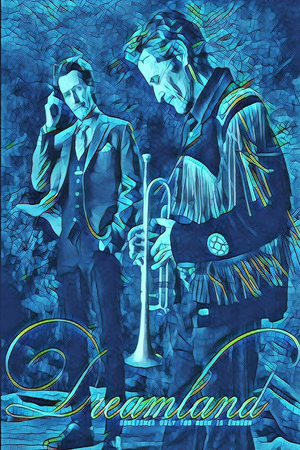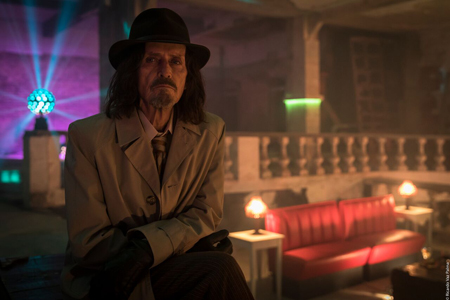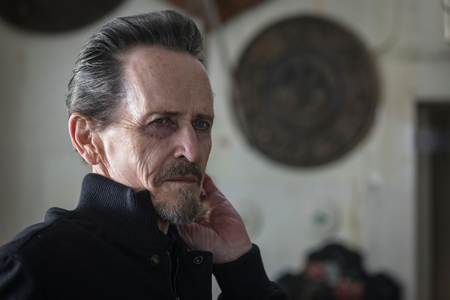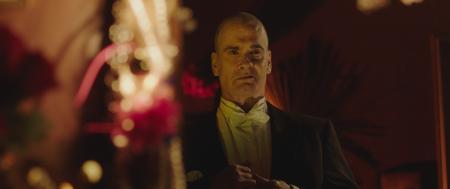Fantasia 2019, Day 5, Part 1: Bruce McDonald’s Dreamland
 I have fond memories of Bruce McDonald’s rock n’roll road movies from the 1990s, specifically Roadkill, Highway 61 Revisited, and Hard Core Logo. It had been a while since I’d seen one of his films (one drifts away from artists, sometimes, like friends we once knew), but I began July 15 at Fantasia in the De Sève Theatre getting reacquainted with McDonald’s art by way of his new movie Dreamland, at Fantasia presented as Bruce McDonald’s Dreamland.
I have fond memories of Bruce McDonald’s rock n’roll road movies from the 1990s, specifically Roadkill, Highway 61 Revisited, and Hard Core Logo. It had been a while since I’d seen one of his films (one drifts away from artists, sometimes, like friends we once knew), but I began July 15 at Fantasia in the De Sève Theatre getting reacquainted with McDonald’s art by way of his new movie Dreamland, at Fantasia presented as Bruce McDonald’s Dreamland.
Written by Tony Burgess and Patrick Whistler, the movie takes place in a European city in which politically powerful aristocrats live in a walled palace while gangsters and assassins roam the streets below. Johnny (Stephen McHattie) is a hitman working for a small-time crime boss, Hercules (Henry Rollins, excellent and electric) who wants to send a message to a trumpet-playing jazz Maestro (also played by McHattie). If his drug addiction doesn’t kill him, the Maestro will be performing for the Countess (Juliette Lewis) who rules the city; her brother, a vampire, is getting married to an unwilling and very underage girl, kidnapped and sold to him by Hercules. Trafficking in young girls is a line Johnny always refused to cross. What will he do now?
I’ve seen reviews criticising the movie for being over-dreamy and not especially linear. I do not understand this. In many ways it struck me as a straightforward story with a few surreal elements — the setting and the vampire, in particular, as well as the dual-casting of McHattie. The plot’s solid, even workmanlike, as characters make moral choices and move the story along to the wedding that marks the big finish of the film. There’s absolutely nothing wrong with any of this, but I wouldn’t call the violent noirish crime plot especially bizarre.
I would say it’s done well. The story moves nicely, and mixes a range of genres with no obvious sense of strain. Oddly, for a film in which crime and horror elements dominate, it’s remarkably light if never exactly cheerful. It is witty, and unpredictable, and entertaining. McHattie alone makes the film worthwhile, playing both the guarded, sharp, and somehow beaten-down Johnny, and the bitter, ruthless Maestro. Scenes in which the two characters meet come off perfectly.
 The movie looks nice, too. McDonald alternates two visual tones through the film, a bright washed-out feel for daylight exteriors, and an interior lighting scheme with rich hues and lots of shadows. We get that especially in Hercules’ club, the Al Quaeda, but it’s an approach that tends to mark nighttime exteriors as well. There is a kind of daylight sense, then, and a dreamland sense — but the climax uses the brighter lighting scheme, which I found emphasised that Johnny was to some extent out of his element.
The movie looks nice, too. McDonald alternates two visual tones through the film, a bright washed-out feel for daylight exteriors, and an interior lighting scheme with rich hues and lots of shadows. We get that especially in Hercules’ club, the Al Quaeda, but it’s an approach that tends to mark nighttime exteriors as well. There is a kind of daylight sense, then, and a dreamland sense — but the climax uses the brighter lighting scheme, which I found emphasised that Johnny was to some extent out of his element.
Thematically, there are a number of ways to read the movie’s material. It may be that like a dream it’s not made with a single interpretation in mind. Personally, I was struck by one of Johnny’s lines, in which he says we start out as many people but over time become just one; given the man delivering the line plays another role in the film, it feels resonant. If so, it may hint that the film’s looking at two ways to live a life.
Johnny’s a killer, but in some ways a good man, who takes action out of a basic sense of morality as the film goes on. He does what he can in an unjust profession. On the other hand, the Maestro’s a true artist, everyone in the film agrees on that, but also an addict who’s prepared to pawn an antique trumpet to get the money for a fix. He’s willing to collude with the corrupt aristocrats in order to get a venue for his art. One of the other characters suggests that as an artist, his whole life is a question; if so, perhaps that means he’s a contrast to Johnny’s certainty.
 Perhaps not. But it’s an interesting idea to me, because as a filmmaker McDonald’s in an artistic profession shaped by access to funding. It’s very tempting to see him working through some of his own doubts and tensions in this story. Is it better to be an artist performing at a cruel ceremony for corrupt people? Or a man with a dark past trying to become a better man?
Perhaps not. But it’s an interesting idea to me, because as a filmmaker McDonald’s in an artistic profession shaped by access to funding. It’s very tempting to see him working through some of his own doubts and tensions in this story. Is it better to be an artist performing at a cruel ceremony for corrupt people? Or a man with a dark past trying to become a better man?
At any rate, the film’s engaging because it prompts one to think about these kinds of questions while also filling the screen with elegant violence and unexpected comedy. You never know what comes up next in this film: a gang of preteen assassins; a trip to rob a pawnshop that doesn’t go the way the thief expected; the glee of a vampire. There is an internal logic here, which is why I’m so surprised at the bafflement of other critics, but it’s certainly original in a number of ways.
I do have to say that it was a little chilling to watch this movie as Jeffrey Epstein was in the news. The plot, after all, is driven by a group of rich people buying tween girls for their own pleasure. The dreamlke sense was impeded by the fact that one was not, after all, watching something much beyond reality at all. But then on the other hand it make the satire in the film more pointed and real, the way the rich are shown in Dreamland: as literal vampires, as aristocrats distant from the people, as oppressive and cruel and silly to the point they do not understand empathy. These are people that lack a specific human dimension, and that is sadly believable.
 Of course a society in which these people are the ruling class will be dysfunctional. Of course children will be assassins. Of course the greatest artist is also a drug addict. Of course the most moral person in the entire principality is a hitman. This is what might be. It is not a real place, not yet, not a portrait of an actual city. This is a venue for a story, a stage on which symbols holding latent meaning interact and attack each other. This is Dreamland, and it is a strong film that goes through darkness and pain and ends up weirdly uplifting.
Of course a society in which these people are the ruling class will be dysfunctional. Of course children will be assassins. Of course the greatest artist is also a drug addict. Of course the most moral person in the entire principality is a hitman. This is what might be. It is not a real place, not yet, not a portrait of an actual city. This is a venue for a story, a stage on which symbols holding latent meaning interact and attack each other. This is Dreamland, and it is a strong film that goes through darkness and pain and ends up weirdly uplifting.
Find the rest of my Fantasia coverage from this and previous years here!
Matthew David Surridge is the author of “The Word of Azrael,” from Black Gate 14. You can buy collections of his essays on fantasy novels here and here. His Patreon, hosting a short fiction project based around the lore within a Victorian Book of Days, is here. You can find him on Facebook, or follow his Twitter account, Fell_Gard.